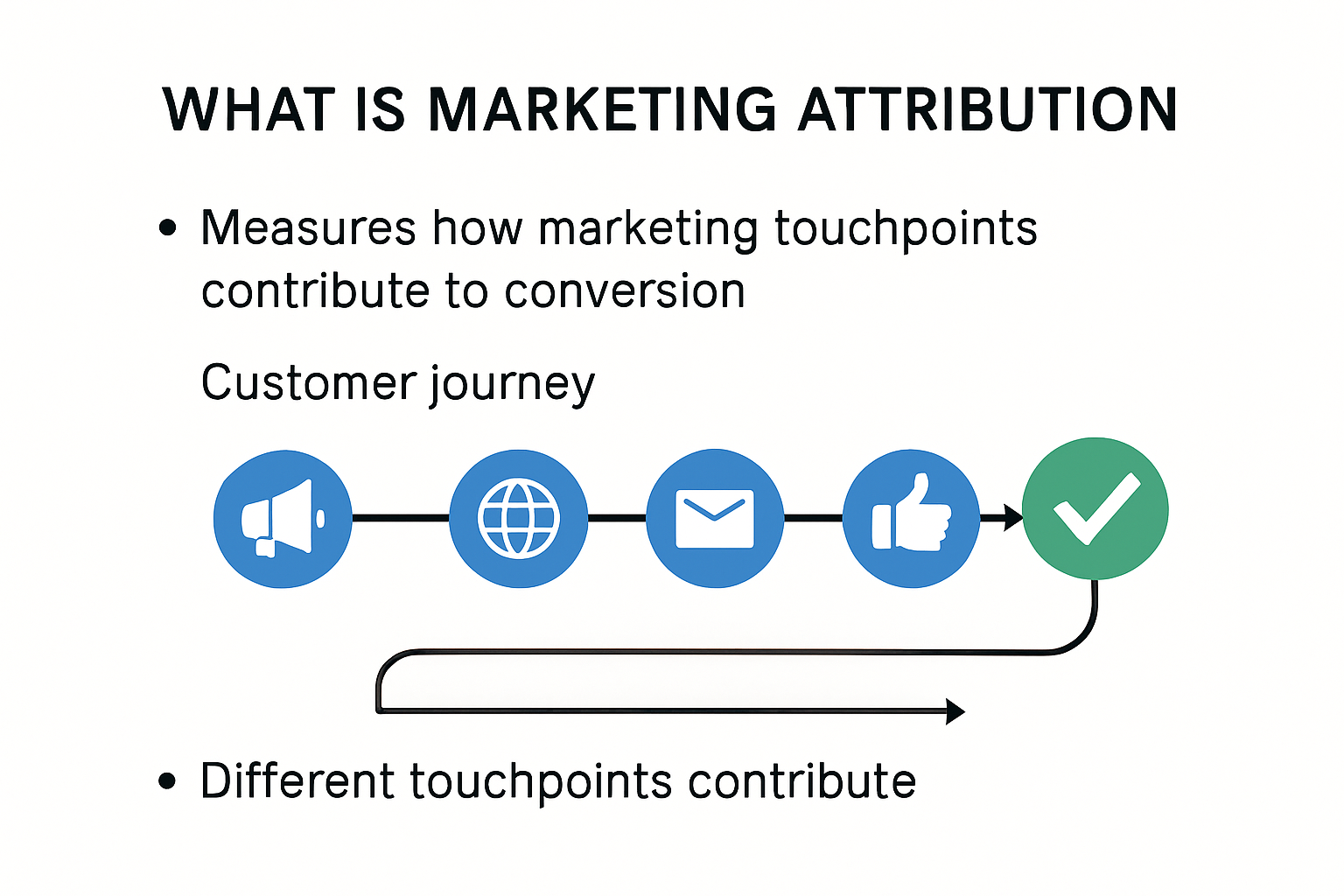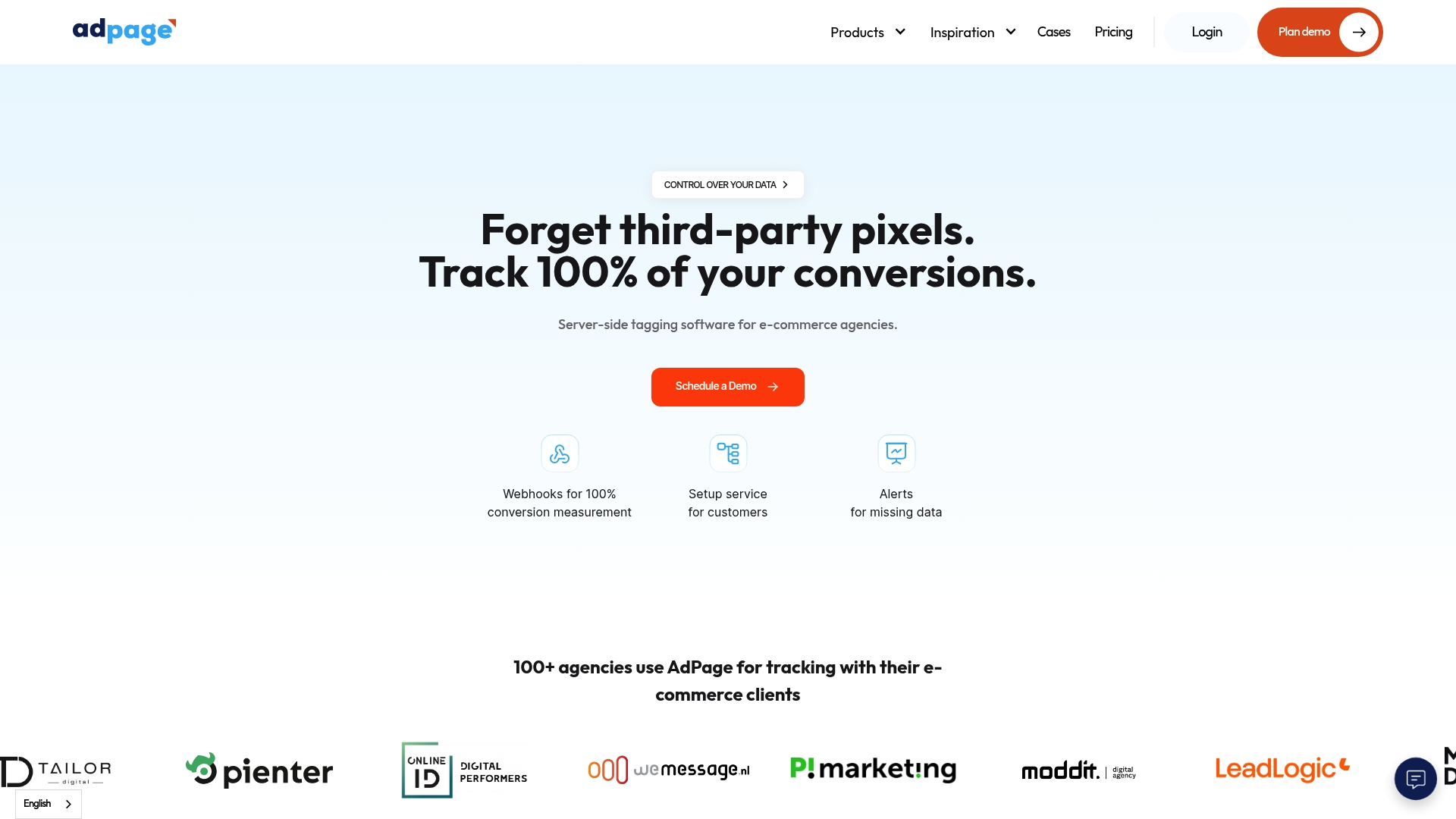Marketing attribution can sound like a tangled web of charts and touchpoints. Yet, over 72 percent of brands now consider attribution vital for deciding where to spend every marketing pound. Most people believe a single click seals the deal, but the truth is your customer's journey is anything but simple. Sometimes the secret to higher sales is hidden in the paths nobody's watching.
Table of Contents
- Defining What Is Marketing Attribution
- Popular Marketing Attribution Models Explained
- Why Attribution Matters For Conversion Optimization
- Choosing The Right Attribution Tools In 2025
Quick Summary
| Takeaway | Explanation |
|---|---|
| Marketing attribution simplifies customer journey tracking | It helps businesses understand which touchpoints lead to conversions, thus revealing the effectiveness of various marketing strategies. |
| Utilize multi-touch attribution models for deeper insights | These models provide a more comprehensive view of customer interactions, allowing for better resource allocation across channels. |
| Invest in advanced attribution tools for future growth | Employing cutting-edge technologies and machine learning can significantly enhance your understanding of marketing performance. |
| Capture complex marketing interactions with new technologies | Advanced attribute models can better predict customer behavior by integrating various data sources and accounting for complex touchpoints. |
| Optimize marketing spend based on attribution insights | Understanding channel performance allows businesses to allocate budgets effectively and improve return on investment. |
Defining What Is Marketing Attribution
Marketing attribution represents a sophisticated analytical approach that empowers businesses to understand how different marketing channels and interactions contribute to customer conversions and sales. Marketing attribution is fundamentally about tracing and crediting the specific touchpoints that influence a customer's purchasing decision.

The Core Mechanics of Marketing Attribution
At its essence, marketing attribution provides a systematic method for evaluating the performance of various marketing channels. According to SearchEngine Land, marketing attribution identifies which marketing touchpoints contribute most significantly to a customer's journey before making a purchase. This means tracking interactions across multiple platforms like social media, email campaigns, paid advertisements, and organic search results.
The process involves detailed tracking and analysis of customer interactions. Businesses can understand which marketing efforts are truly driving revenue by assigning credit to specific channels based on their impact. For instance, if a customer initially discovers a product through a social media ad, then receives an email newsletter, and finally makes a purchase after clicking a Google search ad, attribution models help determine how much credit each touchpoint deserves.
Why Marketing Attribution Matters for Modern Businesses
As noted by CDP, marketing attribution is critical because it transforms raw data into actionable insights. Without proper attribution, businesses operate blindly, unable to understand which marketing strategies genuinely drive conversions. Modern marketing requires precision understanding of customer behavior.
Key benefits of implementing robust marketing attribution include:
- Optimized Marketing Spend: Allocate budgets more effectively by identifying high-performing channels
- Enhanced Customer Understanding: Gain deeper insights into customer decision making processes
- Improved ROI Tracking: Directly correlate marketing activities with revenue generation
By leveraging advanced attribution models, businesses can move beyond simplistic "last click" measurements and develop nuanced strategies that recognize the complex, multi-channel nature of contemporary customer journeys. This approach enables more intelligent, data-driven marketing decisions that can significantly improve overall business performance.
Here is a table summarizing the key benefits of marketing attribution mentioned in this section:
| Benefit | Description |
|---|---|
| Optimized Marketing Spend | Allocate budgets more effectively by identifying high-performing channels |
| Enhanced Customer Understanding | Gain deeper insights into customer decision-making processes |
| Improved ROI Tracking | Directly correlate marketing activities with revenue generation |
| More Intelligent Decision-Making | Move beyond simplistic models to recognize complex, multi-channel customer journeys |
| Strategic Advantage | Enable businesses to make data-driven marketing decisions for improved overall outcomes |
Popular Marketing Attribution Models Explained
Marketing attribution models provide structured approaches for understanding and crediting various marketing touchpoints in a customer's journey. These models help businesses analyze how different channels contribute to conversions and sales, enabling more strategic marketing investments.
Single-Touch vs Multi-Touch Attribution Models
According to MarTech, marketing attribution models can be broadly categorized into two primary types: single-touch and multi-touch models. Single-touch models assign credit to just one touchpoint in the customer journey, while multi-touch models distribute credit across multiple interactions.
Single-touch models include:
- First-Click Model: Credits the initial channel that introduced the customer to the brand
- Last-Click Model: Gives full credit to the final touchpoint before conversion
Multi-touch models offer more nuanced insights by recognizing the complexity of customer interactions. As explained by the Content Marketing Institute, these models acknowledge that conversion is rarely the result of a single interaction.
Here is a comparison table of the major attribution model types covered:
| Attribution Model Type | Example Models | Credit Assignment Description |
|---|---|---|
| Single-Touch | First-Click, Last-Click | Assigns all credit to one touchpoint (first or final interaction) |
| Multi-Touch | Linear, Time Decay, U-Shaped | Distributes credit across multiple customer journey interactions |
Advanced Attribution Model Strategies
Multi-touch attribution models provide sophisticated ways of understanding customer journeys. Some prominent models include:
- Linear Model: Distributes equal credit across all touchpoints
- Time Decay Model: Assigns more credit to touchpoints closer to the conversion
- U-Shaped Model: Gives more weight to first and last interactions, with remaining credit distributed among middle touchpoints
Research from EducationDynamics suggests that choosing the right attribution model depends on specific business objectives, sales cycle complexity, and marketing strategy.

By understanding and implementing appropriate attribution models, businesses can gain deeper insights into their marketing performance. These models transform raw interaction data into strategic intelligence, enabling more targeted and efficient marketing investments that directly contribute to revenue generation.
Why Attribution Matters for Conversion Optimization
Conversion optimization sits at the heart of successful digital marketing strategies, with marketing attribution serving as a critical analytical tool that transforms raw data into actionable insights. Understanding the precise impact of marketing channels on customer behavior enables businesses to make more informed, strategic decisions about resource allocation and campaign design.
Revealing the Customer Conversion Journey
According to research published in Analytics Magazine, understanding the components that impact conversion decisions requires a sophisticated approach to attribution. Creative messaging, channel selection, timing, and historical interactions all play crucial roles in determining how customers ultimately make purchasing decisions.
The complexity of modern customer journeys means that simplistic measurement techniques no longer suffice. Customers interact with brands across multiple touchpoints, from social media advertisements to email campaigns, organic search results, and direct website visits. A study in Marketing Science demonstrated that the choice of attribution model can significantly affect revenue returns, highlighting the critical nature of selecting an appropriate strategy.
Advanced Attribution for Precision Marketing
Advanced attribution models provide unprecedented insights into marketing performance. Research published in ScienceDirect introduced data-driven Bayesian network attribution models that can predict conversion probabilities in real-time with remarkable accuracy. These sophisticated approaches allow marketers to:
- Identify High-Performance Channels: Precisely understand which marketing channels generate the most valuable conversions
- Optimize Marketing Spend: Allocate resources more effectively by focusing on channels with the highest conversion potential
- Understand Customer Behaviour: Gain deeper insights into the complex paths customers take before making a purchase
By implementing robust attribution models, businesses can transform their marketing strategies from guesswork to data-driven precision. The ability to track and analyze each touchpoint provides a comprehensive view of the customer journey, enabling more intelligent decision-making and ultimately driving higher conversion rates.
The ultimate value of marketing attribution lies in its power to turn complex customer interaction data into clear, actionable strategies. As digital marketing continues to evolve, businesses that master attribution will gain a significant competitive advantage in understanding and influencing customer behavior.
Choosing the Right Attribution Tools in 2025
Selecting the appropriate attribution tools represents a critical strategic decision for businesses seeking to optimize their marketing performance. As digital marketing landscapes become increasingly complex, the right attribution technology can transform raw data into actionable insights that drive meaningful business growth.
Emerging Technologies in Attribution Modeling
According to research from LinkedIn's data science team, next-generation attribution tools are leveraging advanced transformer-based approaches capable of handling multi-dimensional data sources. These sophisticated technologies can integrate member-level insights, aggregate data, and even incorporate external macro factors, providing unprecedented depth of analysis.
Modern attribution tools need to address several key requirements:
- Data Integration Capabilities: Seamlessly combine data from multiple marketing channels
- Advanced Analytical Algorithms: Utilize machine learning and neural network technologies
- Real-Time Processing: Provide immediate insights into marketing performance
Advanced Neural Network Approaches
Research presented in the "Next-Generation Neural Networks for Marketing Mix Modeling" paper highlights transformative approaches in attribution technology. Transformer-based neural networks now offer sophisticated methods for capturing complex marketing interactions, moving beyond traditional linear attribution models.
These advanced tools demonstrate remarkable capabilities in:
- Capturing long-term marketing effects
- Modeling intricate channel interactions
- Providing more nuanced conversion predictions
The DCRMTA research on causal representation further emphasizes the importance of developing unbiased attribution models. By extracting causal features and eliminating confounding variables, modern tools can provide more accurate conversion predictions across diverse data environments.
Businesses should prioritize attribution tools that offer:
- Comprehensive Data Analysis: Tools that can process multiple data sources
- Machine Learning Integration: Advanced algorithms for deeper insights
- Customization Options: Flexibility to adapt to specific business needs
As we move into 2025, the most effective attribution tools will combine sophisticated technological capabilities with intuitive user interfaces. The goal is not just to collect data, but to transform that data into strategic marketing intelligence that drives tangible business outcomes.
The future of marketing attribution lies in intelligent, adaptive systems that can quickly interpret complex customer journeys. Businesses that invest in cutting-edge attribution technologies will gain a significant competitive advantage, turning data into a powerful strategic asset.
Frequently Asked Questions
What is marketing attribution?
Marketing attribution is the analytical process of identifying and crediting the specific marketing channels and interactions that contribute to a customer's purchasing decision. It helps businesses understand the effectiveness of their marketing strategies.
Why is marketing attribution important for e-commerce?
Marketing attribution is crucial for e-commerce as it allows businesses to optimize their marketing spend by identifying which channels drive conversions. It also provides insights into customer behavior, enabling more targeted marketing strategies.
What are the different types of marketing attribution models?
There are two main types of marketing attribution models: single-touch and multi-touch. Single-touch models attribute all credit to one touchpoint, while multi-touch models distribute credit across multiple interactions in the customer journey.
How can businesses choose the right attribution tools?
When selecting attribution tools, businesses should look for features such as data integration capabilities, advanced analytical algorithms, and real-time processing to effectively analyze marketing performance and optimize strategies.
Unlock Precise Marketing Attribution Without Losing Critical Data
Many marketers feel frustrated when traditional analytics methods fail to capture the full story behind every conversion. As you learned in this guide to marketing attribution, relying on outdated tagging can mean valuable customer interactions vanish unnoticed, leaving your campaign results uncertain. The article highlights how modern attribution models demand complete, accurate data tracking to truly optimize your marketing spend and improve ROI. If you have ever struggled with data loss or incomplete conversion attribution, you are certainly not alone.

Experience the difference with AdPage's server-side tagging. Our advanced platform empowers marketing agencies and online retailers to monitor 100% of conversions, maintain GDPR compliance, and integrate effortlessly with leading e-commerce platforms. Stop letting incomplete data hold your business back. Visit AdPage right now to see how our tracking and consent management solutions can help you build actionable insights and finally move from guesswork to strategic growth.



.png)
